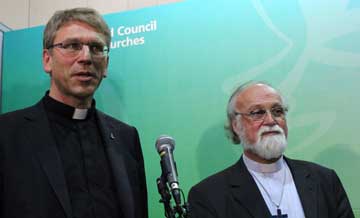
Two executives of the World Council of Churches, speaking to a packed news conference in Busan, Republic of Korea, pressed for an understanding of the global ecumenical organization as a facilitator of interchurch (and interfaith) dialogue and cooperation. Their remarks came during a 45-minute news conference on Thursday, October 31, as the first full day of meetings and “ecumenical discussions” wrapped up.
The questions stemmed from the protests found outside the BEXPO Center in Busan where 4,000 delegates are meeting. Approximately 200 international and local reporters crowded the press center to ask questions in English and Korean, with a member of the Korean House Committee for the WCC Assembly providing translation.![MEETING THE PRESS: The Rev. Dr. Olav Fyke Tveit, left, general secretary of the World Council of Churches, and Dr. Walter Altmann, right, WCC moderator, listen to media questions during a news conference at the group's 10th Assembly, October 31, 2013, in Busan, Republic of Korea. [Mark A. Kellner/AR]](https://adventistreview.org/wp-content/uploads/2022/01/13-10-31-2.jpg)
Asked about addressing the persecution of Christians in the Middle East, Africa and other areas – often at the hands of non-Christians – the Rev. Dr. Olav Fykse Tveit, WCC general secretary, said that while the group has as its purpose the expression of “Christian solidarity” with the persecuted, “we have had to address this in different ways.”
Tveit said the 10th Assembly of the WCC is expected to produce statements on the politicization of religion and one on the status of Christians in the Middle East. However, he said, “words are quite powerful,” and some Christians in the region “do not want to be described as being under conflict” or under persecution.
Asked if the “prophetic voice” of the World Council of Churches had “become a whisper,” Tveit admitted that, as opposed to “decades ago,” the body has a more difficult time reaching the public than it once did. However, he added, “not everything we do and say is for [consumption by] the secular press, but to make member churches able to express their message. The WCC is not only [the] Geneva [headquarters], but also the member churches.”
WCC Moderator Rev. Dr. Walter Altmann added, “Sometimes a whisper can be as effective or more so than a loud voice,” a remark that drew some appreciative chuckles from the media throng.
Much of the rest of the press conference centered on various peace-seeking efforts of the WCC, including plans for interfaith dialogue over the situation in Syria once a new round of United Nations-sponsored intergovernmental negotiations are held in Geneva.
“We will try to gather Syrian church leaders and Muslim leaders for wider discussions to promote the results of the Geneva talks,” Tveit said. He declined to specify when those meetings might take place, pending the confirmation of the U.N. effort.
Tveit also said the group will reach out to church leaders in the Republic of Korea, commonly referred to as South Korea, and the Democratic People’s Republic of Korea, commonly referred to as North Korea, in order to foster reconciliation and perhaps reunification. The topic is close to the hearts of many South Koreans, as evidenced by the media questioning on the topic.
He later added, responding to another questioner on the topic, “Nobody knows what God can do through what we can do, but we should continue to do what is right” to seek peace.
Responding to protests outside the BEXPO Center against the WCC, which a Russian reporter claimed were over a WCC “policy” on homosexuality, Altmann said the group does not have a position for or against homosexuality, leaving that to individual member churches.
“We have no authority to speak on behalf of the [member] churches on any issue,” Altmann said.
Tveit added, “The WCC can only have policies or common statements when there is a consensus” among the membership. “We know homosexuals are in all the churches, so this is not only about an ‘issue,’ but also about sisters and brothers in our fellowships,” he added.
Altmann later asserted protests against the group often stem from a "misunderstanding" of its purpose and intentions. "We are not replacing any church -- the WCC is a place for collaboration and cooperation" among denominations, Altmann added. "We are committed by our Lord to unity, but there is not a structured program of melting the churches to have a 'super church.'"